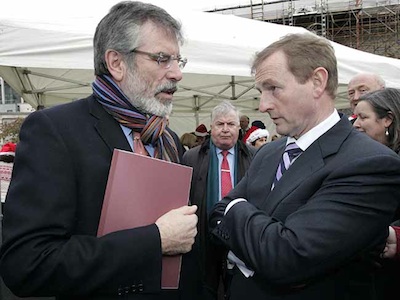
Fine Gael has drawn the opening lines of attack for the next election, targeting Sinn Fein on economic policy and setting the scene for a new left/right alignment in Irish politics.
Speaking on the Isle of Man on Friday, Taoiseach Enda Kenny said voters would face a clear choice in the general election between a coalition led by his party or by Sinn Fein.
“The situation is becoming much clearer; the divide in Irish society, the choice will be a Fine Gael-led government or a group possibly led by Sinn Fein,” he said at a British-Irish Council meeting.
He and other Fine Gael leaders have been voicing the possibility of voters being presented with only two effective options for government, another right-wing administration led by Fine Gael or a new, left-wing coalition led by Sinn Fein.
Mr Kenny said that the electorate needs to consider that divide, and the options it offers, “very carefully”.
“Do they want responsibility and growth and prosperity and jobs in government?” he asked. “Or do they want a government put together that has the potential to absolutely wreck every advancement we’ve made?”
Sinn Fein leader Gerry Adams responded to the comments by saying the election should be held “straight away”.
In a statement, Mr Adams said that he believes citizens want a change from the conservative politics of Fine Gael and Fianna Fail and Labour and are open to voting for genuine republican politics.
“Since taking office Fine Gael and Labour under Enda Kenny’s leadership has stumbled from one debacle to another,” he said. “Their policies have been rejected and the Government now faces widespread public anger. Government support has now been eroded beyond the point where they can claim a mandate for what they are doing.”
Adams urged the government to call an election now and “let the people decide.”
KNIVES OUT
Speculation has been mounting that a general election will take place by the end of 2015 at the latest. Labour leader Joan Burton openly admitted this week she has begun preparations for next year. It was also reported that many Fine Gael staff members have been told to concentrate solely on electoral issues.
Sinn Fein held a meeting on Saturday at which it decided the party would select and ratify its election candidates by the end of this year. The party is expected to run at least one candidate in each of the 40 as officials seek to harness a recent surge in support which has seen it become the almost exclusive target of the government parties.
There were ugly exchanges between both sides of Leinster House this week when Labour leader Joan Burton was questioned on the failure to bring a prosecution against the operator of a prominent Irish language school for child sex abuse. Refusing to answer the question, Burton instead spoke at length about the “problem of paedophilia and sex abuse” in the “republican movement”, which she said Sinn Fein had “acknowledged”. The row led to the parliament being suspended three times within an hour as furious Sinn Fein TDs sought to have Burton withdraw the remarks.
Meanwhile, attempts to attack republicanism in general reached a new low with an artificial ‘scandal’ over the singing of a well-known ballad by national soccer chief John Delaney. Delaney was witch-hunted by pro-British journalists in a Dublin pub for the ‘offense’ of singing a Wolfe Tones song in honour of IRA hunger striker Joe McDonnell.
However, the main election battles continue to be over water charges, housing and public taxation. At the sharp end of the government’s financial planning, homelessness is now “out of control”, according to the Simon Community.
The number of people sleeping rough has soared by more than 160pc in the past year. More than 800 children were made homeless in the first 10 months of this year as a result of the housing crisis, with 45 Dublin families losing their homes in the last month alone. Rents have rocketed, particularly in the capital, without any direct response by the government.
Coalition ministers have promised to construct 35,000 homes for social housing in coming years, but thousands of families are being imminently threatened with homelessness, according to the Threshold charity. Sinn Fein’s Dessie Ellis described the housing promises as “bombastic claims which extend well beyond the lifetime of this government”. He said the governments’s housing strategy is “only an exercise in spin”.
But Fine Gael’s Finance Minister Michael Noonan has placed his government’s agenda, if re-elected, on lowering the top rates of tax in order to help the “squeezed middle”. He defined this to include those earning between 33,000 and 70,000 euro a year. In an interview, he also said he would not countenance eliminating the Universal Social Charge, a flat tax introduced as a temporary measure in 2010, and which disproportionately hurts those on the lowest incomes.
He reiterated the difference in strategy between his party and Sinn Fein in successive interviews and at a press conference.
“There’s a clear left/right choice emerging now,” he told reporters. Claiming that Sinn Fein and the “hard left” would increase taxation, Mr Noonan said this was in contrast to his government’s drive to “cut tax”.
“There is a big gulf between the economic policies and nowhere is that clearer than in the attitude to taxation and I was simply pointing out where the political debate is now going and what people should strategically look at,” he said.
![[Irish Republican News]](https://republican-news.org/graphics/title_gifs/rn.gif)
![[Irish Republican News]](https://republican-news.org/graphics/title_gifs/harp.gif)

